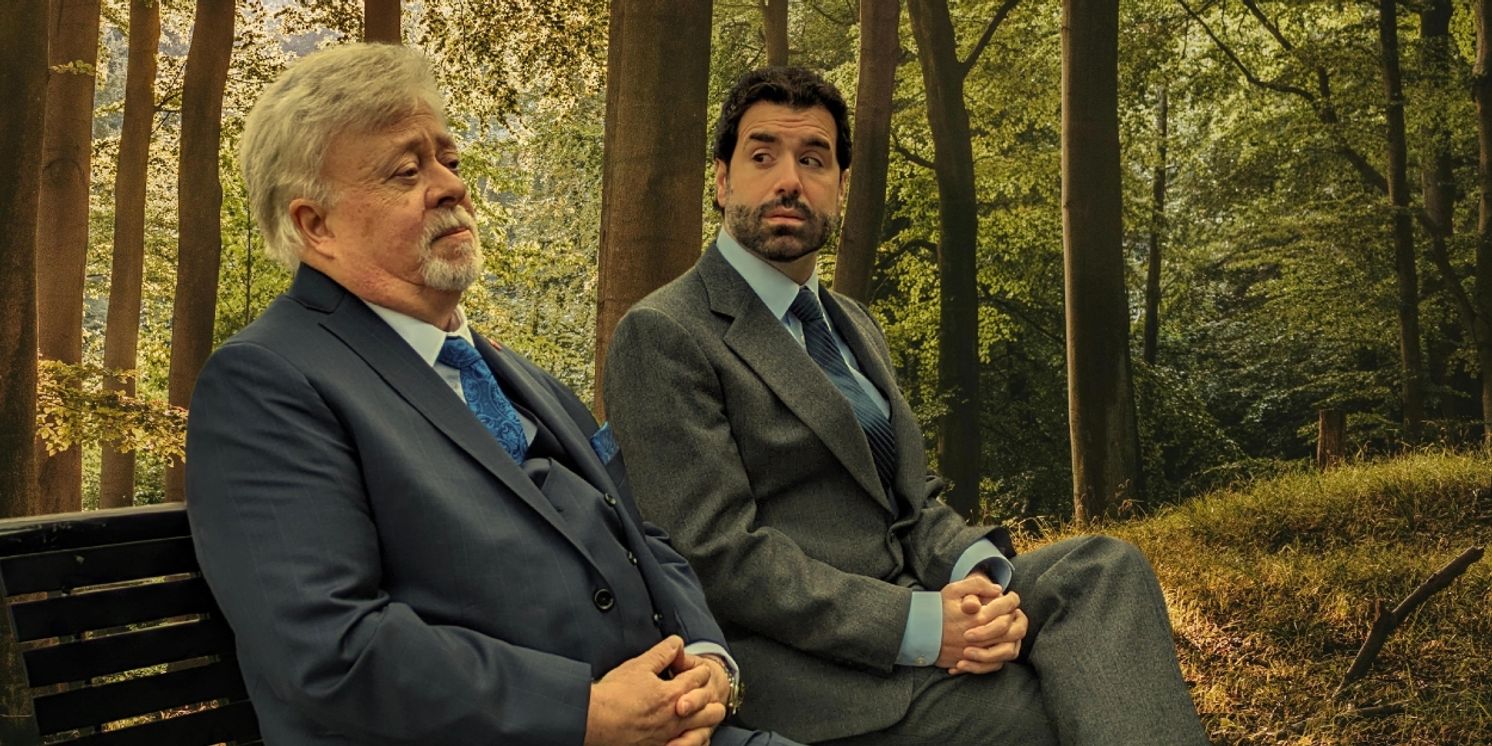Review: A WALK IN THE WOODS at The Abbey Theater
Presented simply, Lee Blessing's Cold War play is simply well done

Sometimes it is the simple things that work the best. In its production of Lee Blessing’s A WALK IN THE WOODS, the Abbey Theater of Dublin (5600 Post Road in Dublin), directors Joe Bishara and Scott Douglas Wilson take a very complex subject (nuclear arms reduction) and put it on a bareboned stage with just two actors and a park bench.
And yet, the result was as engaging as shows with much larger casts and much more intricate staging and costumes. It is a shame it only lasted one week, running May 17-May 19.
Set in the height of the Cold War period, two diplomats, American John Honeywell (Bishara) and the Soviet Union’s Andrey Botvinnik (Tom Holliday), are tasked with producing a proposal to reduce the number of warheads both superpowers possess without either country losing face. A WALK IN THE WOODS is based on a “real life” event when Paul H. Nitze and Yuli A. Kvitsinsky left the 1982 Geneva negotiations for an unofficial "walk in the woods" and achieved a breakthrough. The agreement was then rejected by both the U.S. and Soviet powers that be.
Although the play was written over 40 years ago, three items keep A WALK IN THE WOODS from seeming to be dated. The first, sadly, is, while the Soviet Union is no more, the threat of nuclear war still hangs over us. The second is it has an excellent script. Blessing’s work was nominated for both the Pulitzer Prize for Drama in 1987 and Tony Awards for best play and best actor in a play (Robert Prosky as Andrey Botvinnik) in 1988.
Finally, it is wonderfully acted. Bishara’s non-nonsense Honeywell verbally spars with Holliday’s frivolous Botvinnik. The Soviet diplomat believes the only way the treaty can work is if the two develop an attitude of friendship and trust. Honeywell believes the two must maintain a sense of formality.
Botvinnik counters with, “Formality is simply anger with its hair combed.”
Blessing said his goal was to make Botvinnik as far from the mono-syllabic Russian villains found battling the American Rockys, like Ivan Drago from the 1985 movie Rocky IV or Boris from the “Rocky and Bullwinkle” cartoons.
Holliday makes his character more playful and mischievous than dark and brooding. Botvinnik opens the show by gleefully recalling a prank he pulled on an American news reporter.
“So, I told him … when Brezhnev was in power, he always began each Politburo meeting by saying ‘The survival of the Soviet Union entirely depends on the total annihilation of America,’” the Russian diplomat tells an aghast Honeywell. Then he adds with a shrug. “How was I to know he’d believe it?”
Half of Honeywell’s job is trying to figure out when Botvinnik is joking and when he is serious. He tells his counter part that the Americans refer to Botvinnik as “The Crab,” not because he’s argumentative or disagreeable but because he rarely walks, talks, or acts in a straight line. Therefore, Honeywell believes, any sort of friendship between the two wouldn’t work. “What I am saying about friendship is that it takes us away from the central point,” Honeywell said.
Botvinnik reluctantly agrees and yet, continually picks away at Honeywell’s stony demeanor.
Exasperated, the American points out, “You’re contradicting yourself.”
“I know,” Botvinnik says sadly before adding with a sly smile. “I will go to any length to keep a friend.”
The two meet four times during the course of a year. A green bench is the only piece of physical scenery on the stage, but the projections behind it shows the foliage change from season to season.
Each time the two are satisfied with a proposal, one of the leaders of the respective countries shoot it down for the pettiest of reasons.
At one point, the Soviets reject a proposal the two had slaved over just because the President announced he was for it before the Russians.
“It made us look like fools,” Botvinnik says. “If we accept your proposal now, what will the world say? ‘Ahh, the Americans have finally thought of a clever plan. Thank God, the unimaginative Russians have agreed.’”
While the “Cold War” thaws between the two arms negotiators, the gap between the two countries remains unchanged by the play’s end.
“But who is listening to us?” Botvinnik is forced to conclude. “No, the sad fact is you and I are meant for nothing more than playing games in the woods.”
Photo credit: Daniel Rodriguez Hijo/Abbey Theater of Dublin.
Reader Reviews

Videos

